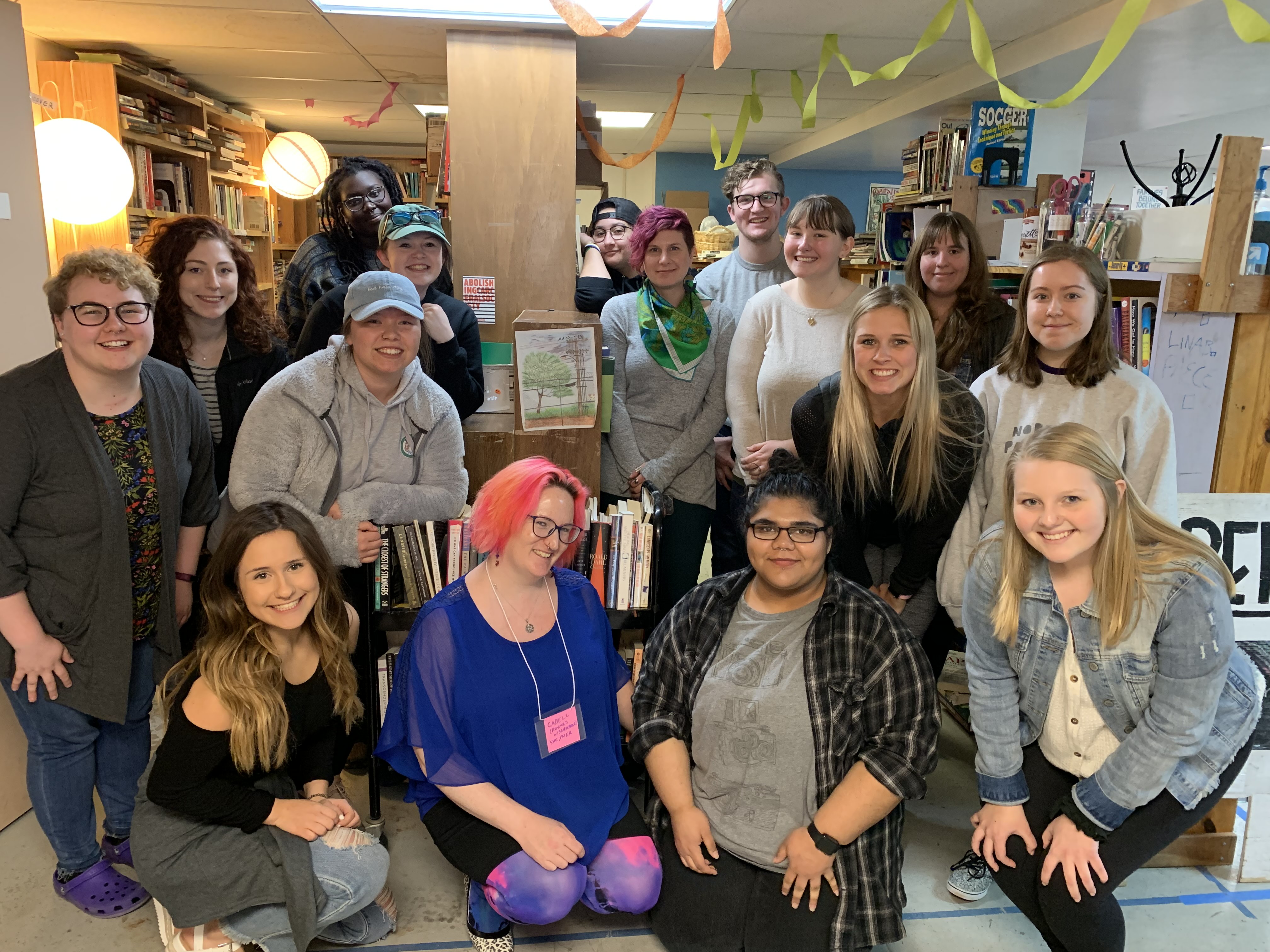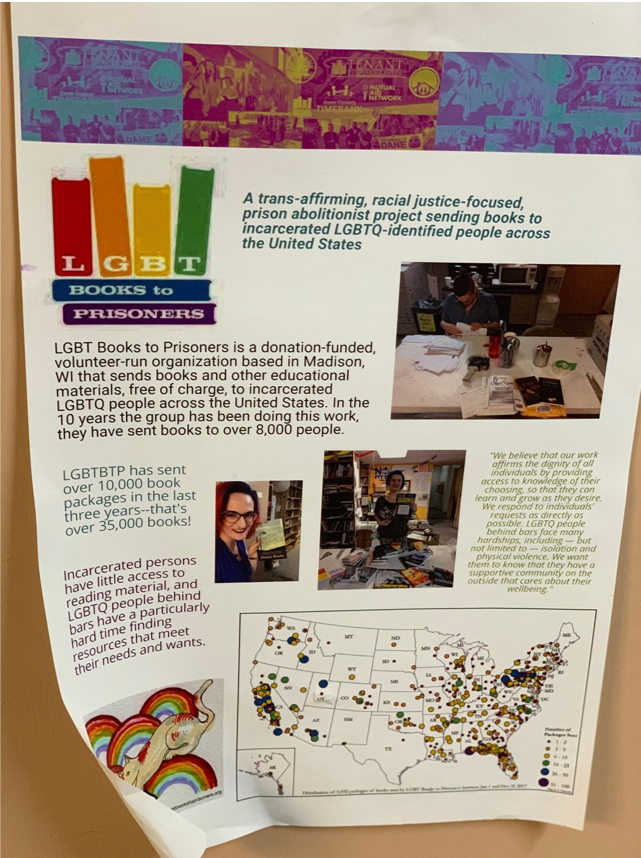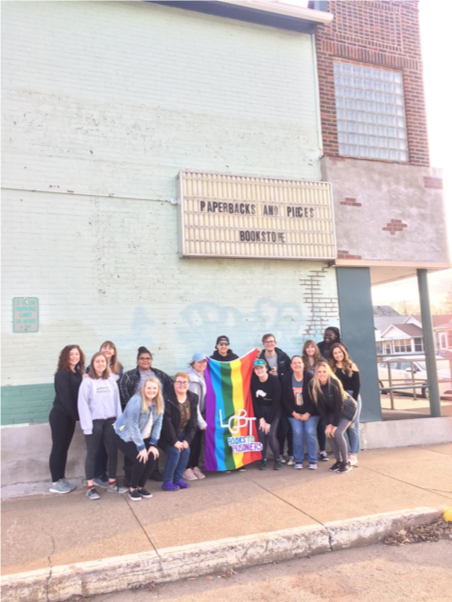
On April 1st, 2019, students from Dr. Mary Jo Klinker’s “Queer Theories and Politics” Class (WGSS 374) at Winona State University went to Madison, WI to meet and volunteer alongside the organization LGBT Books to Prisoners. This allowed them the opportunity to gain hands-on experience in activism and what queer scholar Cathy Cohen refers to as “substantive solidarity.” As she defines it in her December 12, 2014 lecture “#DoBlackLivesMatter? From Michael Brown to CeCe McDonald on Black Death and LGBTQ Politics,”This is a form of solidarity which ‘engages in an intersectional politics of resistance.’” As students, we have the privilege and ability to access books, and as we’ve studied in this course of queering prison abolition, prisoners’ access to books is often harshly limited or denied. Seattle-based activist of Books to Prisoners Michelle Dillon Skyped in to discuss this reality and continues this work in Washington where access has recently been denied.
Background Research and Classroom Discussions 
One of the first readings assigned in class that provided necessary understanding of mass incarceration was “Coming out of Concrete Closets: A Report on Black and Pink’s National LGBTQ Prisoner Survey.” Some of the data found from this study that reflects on the population and hardships that incarcerated LGBTQ+ individuals are subjected to includes that “67% of respondents have been diagnosed with a mental illness; of these, 48% receive no therapy.” Additionally, “70% of respondents experienced emotional pain from hiding their sexuality during incarceration/throughout their interactions with the criminal legal system” and “85% of respondents have been in solitary confinement at some point during their sentence; approximately half have spent two or more years there. Altogether, respondents have spent a total of 5,110 years in solitary confinement.”
When discussing the importance of books, it is necessary to also note that “only 20% of respondents have access to LGBTQ-affirming books” and “15% of respondents have been barred from programs offered by the prison because they identify as LGBTQ” (2015). For many who are privileged, it is easy to view books and education as human rights, or accessible to all. However, these statistics show that not only are prisoners forced to experience staggering rates of violence, suicidality, and minimal social interactions, they are also deprived of expanding their knowledge and the brief escape that books can provide.
Moving from statistics to quotations, another reading that was valuable to furthering our knowledge before this event in regard to prison abolition was “Queering Prison Abolition, Now?” by Eric A. Stanley, Dean Spade, and Queer (In)Justice. In this reading, it is stated that “prison imagery has served its purpose as a weapon to secure compliance beyond trans/queer communities while painting all queers with a brush of sexual depredation that contributes to our criminalization and violation inside and outside prison walls” and “queer liberation and sexual and gender self-determination require that we reach toward abolition, not just of prisons, and for some of us, police, but of the systems that produce them, and which replicate systems of policing and punishment beyond prison walls.” These statements provide insight into some of the key viewpoints behind the prison abolition movement, including the notation of intersectionality that while prisons and police are a part of it, to completely abolish something means to get rid of the system that created it entirely.
Students’ Reflections
 “I had previously learned in class about the reality of prisoners’ lives through watching “Free CeCe”; I also learned the statistics and some personal accounts of how truly violent and damaging prison can be. One of the letters I had included an account of a wrongfully accused individual, and another’s writing was mainly redacted.” – Lauryn Olson
“I had previously learned in class about the reality of prisoners’ lives through watching “Free CeCe”; I also learned the statistics and some personal accounts of how truly violent and damaging prison can be. One of the letters I had included an account of a wrongfully accused individual, and another’s writing was mainly redacted.” – Lauryn Olson
“One trans woman wrote about the medical and psychological care that she had been receiving, while another trans woman discussed the restrictions placed upon her and other trans prisoners, who must conceal their identity and not receive treatment…. If it wasn’t for participating in this solidarity work first-hand, I wouldn’t have known what it is really like for these prisoners.” -Emma L. Odiet
“An important memory was finding a unique book for someone who wanted books to practice their penmanship. Since there were no actual handwriting books, I decided to go with an inspirational quote book with many different fonts for each quote along with a booklet that had the alphabet in multiple fonts.” – Taylor Geurink
“Visiting LGBT Books to Prisoners in Madison, Wisconsin and working in a collaborative setting was hands down one of my most rewarding experiences I have had through WSU… Moreover, being given the opportunity to read letters and find out what folks would like to read, while also being informed on the unnecessary censorship and oppression by the institutions in regard to the books we can select, caused me to place a heavy responsibility over my head to ensure I could get them what they needed – and more.” – Regan Holm
“After reading multiple letters from prisoners all over the country, I understood how much this process means to them. It makes them feel connected to the outside world again and gives them hope that there are still people who care about them and are fighting for social justice on their behalf.” – Sofiya Podberetskaya